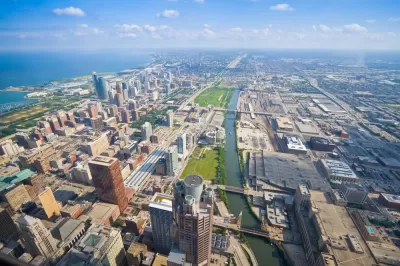The city is losing black residents, but those who stay are relocating to parts of the city with less transportation access and opportunities.

David Zegeye explores the decrease in Chicago's black population and the relationship to transportation access and mobility. "Many population losses happened along formerly vibrant streets, and corridors that have been significant in Chicago’s Black history and culture."
Of the small number of Chicago neighborhoods with increases in black residents, only a handful are historically black neighborhoods, says Zegeye. "What is also striking is that many of these communities are at the edge of the city, where there are fewer businesses, commercial corridors, and transportation options."
Transit and transportation infrastructure improvements are short-term solutions to stemming the flow of black residents, but longer-term strategies also need to address the effects of segregation, says Zegeye. "This can only be done when the city recognizes disinvestment in these neighborhoods as a public health and safety issue, and as an act of injustice."
FULL STORY: How Chicago’s legacy of segregation has pushed Black people into transit, job deserts

Montreal Mall to Become 6,000 Housing Units
Place Versailles will be transformed into a mixed-use complex over the next 25 years.

Planetizen Federal Action Tracker
A weekly monitor of how Trump’s orders and actions are impacting planners and planning in America.

DARTSpace Platform Streamlines Dallas TOD Application Process
The Dallas transit agency hopes a shorter permitting timeline will boost transit-oriented development around rail stations.

ADUs for Sale? San Diego Could Legalize Backyard Condos
As one of 25 proposed amendments, San Diego may soon allow accessory dwelling units to be bought and sold as individual homes.

Dallas Ditches Parking Minimums in 14-1 Vote
The sweeping city council decision removes set parking requirements from developments downtown, near transit, small businesses and more.

Downtown Cleveland Gets First Ever Protected Bike Lanes
The $200,000 “quick build” lanes are the first of 50 planned miles over five years.
Urban Design for Planners 1: Software Tools
This six-course series explores essential urban design concepts using open source software and equips planners with the tools they need to participate fully in the urban design process.
Planning for Universal Design
Learn the tools for implementing Universal Design in planning regulations.
City of Mt Shasta
City of Camden Redevelopment Agency
City of Astoria
Transportation Research & Education Center (TREC) at Portland State University
City of Camden Redevelopment Agency
Municipality of Princeton (NJ)
Regional Transportation Commission of Southern Nevada





























